Scottish prosecutors want to interview two Libyans they have identified as new suspects over the Lockerbie bombing.
They believe the two suspects acted along with Abdelbaset al-Megrahi - the only person to have been convicted of the atrocity.
The BBC understands the pair are Mohammed Abouajela Masud and Abdullah al-Senussi.
A total of 270 people died when the Pan Am 103 flight was blown up on the evening of 21 December 1988.
The flight was on its way from London to New York when it exploded above Lockerbie, in southern Scotland, killing everyone on board and 11 people on the ground.
Senussi was the brother-in-law and intelligence chief of former Libyan dictator Colonel Gaddafi. He is currently awaiting execution in a Libyan jail.
Masud is reported to be serving a prison sentence in Libya for bomb making.
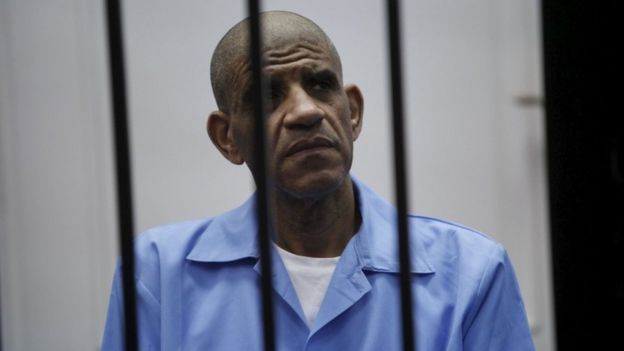 Reuters
Reuters
Both men were named as possible suspects in the bombing by an American TV documentary last month.
Scotland's Lord Advocate Frank Mulholland QC recently met the US Attorney General, Loretta Lynch, in Washington to review progress made in the ongoing investigation.
They have now requested permission from the Libyan authorities for Scottish police and the FBI to interview the two new suspects in Tripoli.
A Crown Office spokesman said: "The Lord Advocate and the US Attorney General have recently agreed that there is a proper basis in law in Scotland and the United States to entitle Scottish and US investigators to treat two Libyans as suspects in the continuing investigation into the bombing of flight Pan Am 103 over Lockerbie.
"The Lord Advocate has today, therefore, issued an International Letter of Request to the Libyan attorney general in Tripoli which identifies the two Libyans as suspects in the bombing of flight Pan Am 103.
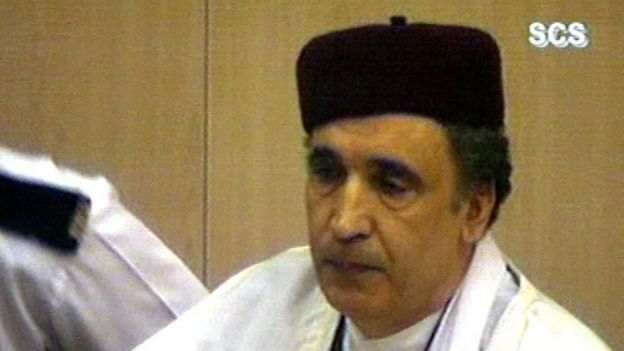 AP
AP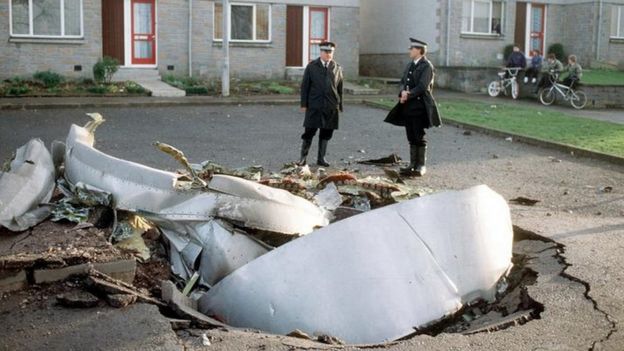 PA
PA
"The Lord Advocate and the US Attorney General are seeking the assistance of the Libyan judicial authorities for Scottish police officers and the FBI to interview the two named suspects in Tripoli.
"The two individuals are suspected of involvement, along with Abdelbaset Ali Mohmed al-Megrahi, in the bombing of flight Pan Am 103 in December 1988 and the murder of 270 people."
The Libyan attorney general declined to comment to the BBC on whether a letter had been received from the Crown Office and whether the Libyan government would be assisting in the investigation.
Rival governments
Libya has struggled to stabilise since ousting long-term leader Colonel Muammar Gaddafi in 2011. Elections in 2014 produced two rival governments as Islamist and secular militias fight for control of the country.
The Crown Office said it would be inappropriate to confirm any identities to preserve the integrity of the investigation.
Megrahi's part in the bombing has been called into question in a series of books and documentaries.
And a petition seeking "Justice For Megrahi", backed by politicians and family members of some victims, was raised at the Scottish Parliament in 2012.
Jim Swire, whose daughter died in the bombing, told the BBC: "I think there is a need for evidence to be made available as to why these two are suspects.
"We have recently been refused permission in Scotland to have to have a further appeal held into Megrahi's conviction, and many in this country simply don't believe Megrahi was involved and that this was a miscarriage of justice.
"To try and bolt two more names on top of that is a very difficult situation. It will need to be supported by better evidence than was produced to achieve the conviction of Megrahi."
But Frank Duggan, president of Pan Am 103 Relatives, told BBC Radio Scotland's Newsdrive programme he was not confident there would be further prosecutions.
He said: "I would like to think there would be, but they would have to be indicted by the US government or by the Scottish government and the Libyan government would have to turn them over - the Libyans have always said they are not going to turn over anyone to a foreign government.
"And it's been 26 years. It's too long, people are dead, stories have been forgotten.
"I'd like to think that it will be one small measure of closure but I don't expect the kind of justice that we all hope for."
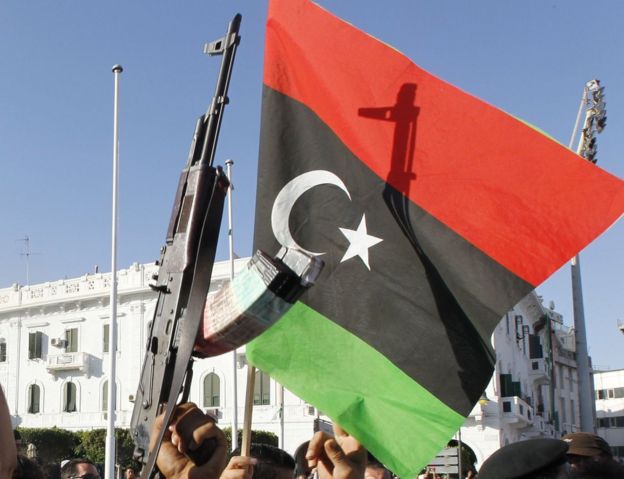 Reuters
Reuters
Analysis by Aileen Clarke, BBC Scotland news
What is being made clear in the information we have had from the Crown Office today is that the two individuals are suspected of involvement, along with Abdelbaset al-Megrahi, in the bombing of Pan Am Flight 103.
On the original indictment that was heard in the Netherlands at the time of the trial, it was always said that it was the two men who went on trial and "others unknown" - so there was a thought at that point by prosecutors that there were going to be others involved as well.
Of course there is a very practical thing here as well, which is that here we have the Scottish prosecutors and the Americans very keen to talk to these two named people in Libya, but that of course may not be quite as easy as we might think because we know that Libya is not very stable at the moment.
So just how easy is going to be for them to get access to these people that they have now decided they really want to speak to? That is just something we are going to have to wait and see.
In December last year, Mr Mulholland said no Crown Office investigator or prosecutor had ever raised concerns about the evidence used to convict Megrahi.
He also pledged to continue tracking down Megrahi's accomplices.
A man who was originally accused of the bombing alongside Megrahi, Lamin Khalifah Fhimah, was found not guilty.
The trial, at Camp Zeist in the Netherlands, which began in May 2000 and lasted 36 weeks, heard that Fhimah was in Sweden at the time of the sabotage and could not have been a participant.
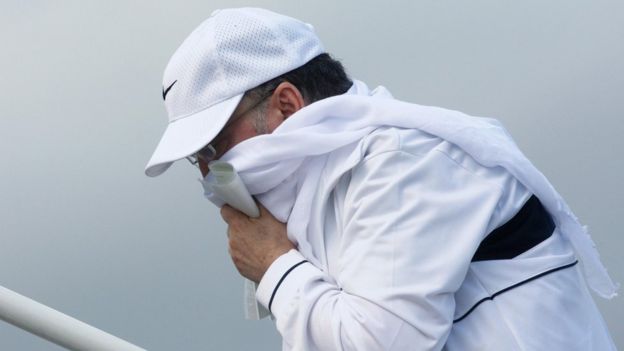 PA
PA
After the judges delivered their unanimous verdict, he was freed and returned to his home at Souk al-Juma in Libya on 1 February 2001.
The ongoing investigation into the bombing remains a joint one between US and Scottish prosecutors, Police Scotland and the FBI.
In December 2013, Libya also appointed two prosecutors to work on the casealongside the US and Scottish prosecutors.
Relatives' appeal
Megrahi was found guilty of mass murder and was jailed for life with a minimum term of 27 years behind bars. He lost his first appeal in 2002.
The following year, he applied to the Scottish Criminal Cases Review Commission (SCCRC) for a review of his conviction.
A £1.1m investigation by the body led to a finding in June 2007 of six grounds where it believed a miscarriage of justice may have occurred.
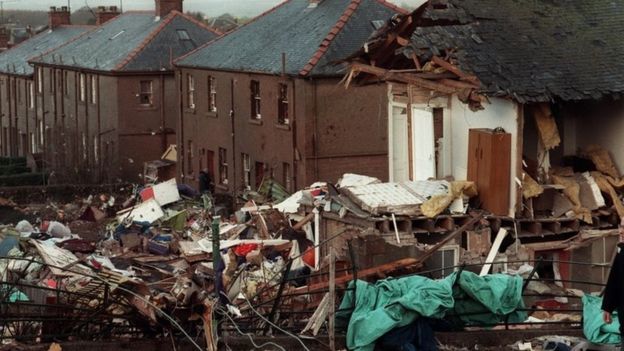 AFP
AFP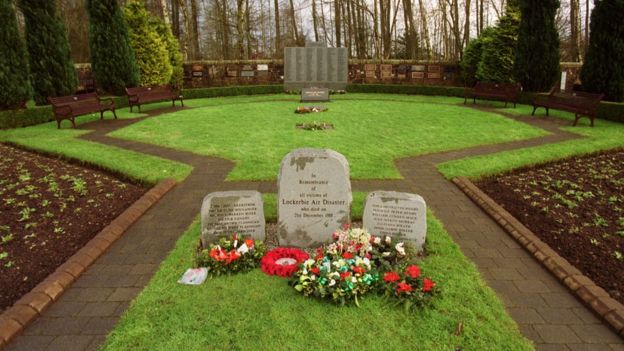
This decision opened the door to Megrahi's second appeal against his conviction. Although a number of hearings had already been held before senior appeal judges, he dropped his appeal two days before being released from prison in August 2009.
Earlier this year, Scottish judges ruled that relatives of the victims of the Lockerbie bombing should not be allowed to pursue an appeal on Megrahi's behalf.
The group of British relatives had argued they had a "legitimate interest" in trying to get his case back before a court for a full appeal.
The SCCRC had asked the Appeal Court in Edinburgh for guidance on whether members of the victims' families could take such a legal move forward.
But judges ruled in July that the law was "not designed to give relatives of victims a right to proceed in an appeal for their own or the public interest".
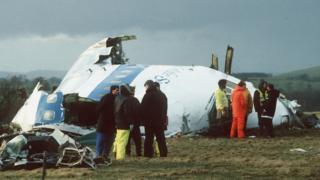
 Stay Updated And Connected With sofogist.Com Daily..
Stay Updated And Connected With sofogist.Com Daily.. 





